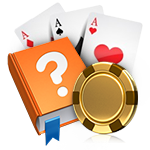Reverse Implied Odds
-
Tips for beginners
- Poker rules
- hands
- Texas Hold'em
- Texas Hold'em Cash Games
- Top 10 tips
- glossary
Tipps für Anfänger -
Basic strategies
- Chances of winning & odds
- Position
- The bluff
- Semi Bluffs
- Protect leaves
- 5-10 rule
- I can control
- Komfortlevel
- Value Bets
- River Play
- Turn Play
- Heads Up
Grundlegende Strategies -
Strategies for advanced users
- Implied Pot Odds
- Reverse Implied Odds
- Short Stacks
- Errors in the Limit Ascent
- game schedule
- Moving Forward, Falling Behind
- Blinds
- Draws
- Expected value
- Preflop
- Ranges
Strategies für Fortgeschrittene - Online Poker
-
Live Poker
- Live tournaments
- Online vs Offline
- All the important live tournaments
Live Poker - Psychology and mindset
-
Other Poker Variants
- Omaha
- Omaha starting hands
- 5 Card Draw
- Pineapple Poker
- 7 Card Stud
- Triple Draw Lowball
Andere Poker Varianten
Skilled poker players have a deep understanding of mathematical concepts and possess the knowledge to navigate terms like outs, odds, pot odds, and implied pot odds. Taking it a step further, there is the concept of reverse implied odds, which holds significant importance, especially in the game of No Limit Hold'em Poker. Poker-6.com provides a comprehensive explanation of what reverse implied odds are and offers expert advice on how to effectively manage them.
Definition
Reverse Implied Odds, or in German, "Umgekehrte implizierten Wahrscheinlichkeiten," are a concept introduced and explained by the renowned American poker player and author David Sklansky in his famous work "Theory of Poker." Reverse Implied Odds, also known as RIO, refer to a phenomenon in a marginal hand situation where one lacks initiative.
Unlike implied pot odds, reverse implied odds take into account potential losses if the opponent improves their hand or already holds a better hand during the course of the hand. Implied pot odds, on the other hand, consider the money that could still enter the pot. RIO, however, are simply a situational extension of implied odds.
When and why should one calculate reverse odds?
Reverse implied odds become important when a player with an average hand and only a small chance of improvement potentially holds the strongest hand at the moment, but there are still one or more opponents in the game who bet or raise. If the opponent already has a good hand or can improve their hand, it is to be expected that they will continue to bet in the subsequent rounds. On the other hand, if the opponent has bad cards, they are unlikely to bet or even fold their hand. In this case, you would have to invest more money to find out if you're beaten than what you could potentially win.
If you happen to possess the top-notch hand, your focus should primarily be on evaluating the implied odds. However, if you find yourself without the absolute best hand, you may frequently find yourself in a predicament of reverse implied odds, wherein there is always the looming risk of holding only the second-best hand. In these reverse implied odds situations, the odds have the potential to shift unfavorably in specific scenarios.
Situations involving reverse implied odds.
- The player struggles to properly evaluate their own hand.
- The likelihood of receiving a better hand than the opponent currently has or could potentially get is low.
- A call would commit the player to the pot.
- The opponent is seated in "early position" (meaning to the right of oneself).
- The player has additional opponents who could raise again.
Examples of Reverse Implied Odds
Example 1: Player A engages in a poker game with two opponents. One player places a bet, while the other opponent raises it. Player A possesses a strong hand, quite possibly the best at the table. However, there is the possibility that one or both opponents hold a powerful draw, a higher pair, a completed straight, two pairs, or even a set. Consequently, there is a risk that Player A might pay even more only to discover that they were already beaten or that one of the opponents, for instance, acquires the missing card to complete their draw, thereby improving their hand. The opponents will only exhibit less aggression if they have nothing in their hand or if their cards are significantly weaker. In this scenario, Player A would win less when they are ahead, but simultaneously lose more if their hand is inferior to that of an opponent. This has an impact on the pot odds, making a call hardly worthwhile in this case.
Example 2: Player A cold calls A-J in the small blind after an opening raise from middle position. The flop comes A-5-2 rainbow, and Player A decides to call a bet. Now, a 10 appears on the turn, and Player A faces another bet after checking. Player A finds themselves in a bit of a bind because the opponent has control over the betting in the pot, making it incredibly difficult for Player A to fold, yet also extremely challenging to extract value. If Player A tries to raise here, they isolate themselves 100% from all weak hands and will only get action from hands they are far behind (like AK and AQ, for example). Either Player A wins the minimum with their hand because the opponent might simply check behind after another call, resulting in no additional bets for Player A. Alternatively, Player A loses a big pot because they have at least "top pair, good kicker," but have no clue about the opponent's hand.
How do I play reverse implied odds?
In simplified terms, it can be stated that in a situation involving reverse implied odds, you should only consider calling with a draw if you have favorable pot odds. Otherwise, it is advisable to abandon the draw, as reverse implied odds typically hold greater significance than pot odds. Opting for a fold in situations with unfavorable reverse implied odds is the safer approach.
Skilled poker players strive to avoid getting into risky situations involving reverse implied odds. However, assessing the situation accurately can often pose a challenge. For instance, a hand with promising implied odds in a 100-BB game can turn into a perilous one in a 500-BB game due to reverse implied odds. Consider a set, which is usually a playable hand without hesitation in a 100-BB game. Yet, in a 500-BB game, the likelihood of success with such a strategy is significantly diminished.
If you find yourself in a situation where you prefer calling over betting or check-folding, it can be a good indication that you are in a RIO (Reverse Implied Odds) situation. That's why it's crucial to consider beforehand whether you might end up in a RIO situation, so you can save money on later streets. Both in position (IP) and out of position (OOP), these situations are the most challenging in poker because you simply don't know where you stand. You neither have control over the pot nor have taken the initiative at a certain point in the hand. It's like playing a guessing game, and as a skilled poker player, you never want to act without knowing precisely why you're making a certain move.
-
Tips for beginners
- Poker rules
- hands
- Texas Hold'em
- Texas Hold'em cash games
- Top 10 tips
- glossary
Tipps für Anfänger -
Basic strategies
- Chances of winning & odds
- Position
- The bluff
- Semi Bluffs
- Protect leaves
- 5-10 rule
- I can control
- Komfortlevel
- Value Bets
- River Play
- Turn Play
- Heads Up
Grundlegende Strategies -
Strategies for advanced users
- Implied Pot Odds
- Reverse Implied Odds
- Short Stacks
- Mistakes in the Limit Ascent
- game schedule
- Way Ahead, Way Behind strategy
- Blinds
- Draws
- Expected value
- Preflop
- Ranges
Strategies für Fortgeschrittene - Online Poker
-
Live Poker
- Live tournaments
- Online vs Offline
- All the important live tournaments
Live Poker - Psychology and mindset
-
Other Poker Variants
- Omaha
- Omaha starting hands
- 5 Card Draw
- Pineapple Poker
- 7 Card Stud
- Triple Draw Lowball
Andere Poker Varianten



